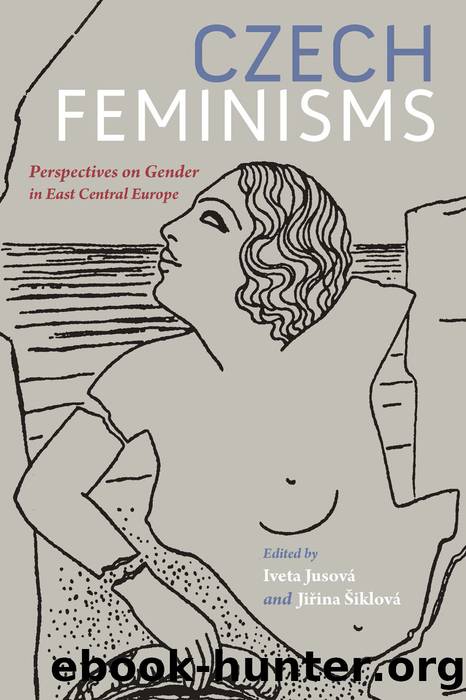Czech Feminisms by Unknown

Author:Unknown
Language: eng
Format: epub
Publisher: Indiana University Press
Published: 2016-07-14T16:00:00+00:00
NEW CIRCUMSTANCES, NEW CHALLENGES
In her article “Ženská romská próza jako zápas o sebevyjádření” (Romany Women’s Writing as a Struggle for Self-Expression, 2010), Alena Scheinostová offers the following analysis of contemporary Romany writing: One group of authors draw directly on folklore, perpetuating the spoken word and its function as entertainment and instruction. They relate to the world of the old Roma in its idealized form, they declare their intention to capture and preserve its values, and their protagonists act on the repertoire of stock characters, rather than on individual will (see also Ryvolová 2005, 32). The other group, most of whom, significantly, are women, broach subjects formerly deemed improper (e.g., having to do with the female sphere of life and the woman’s body) or look for answers and solutions to new situations, which romipen as a manual for everyday life does not cover.
A representative of phure Roma and a proponent of romipen, the short story writer Andrej Giňa (born 1936) could be viewed as an example of the first trend. Frequently representing gender roles in the traditional prewar Romany community, Giňa’s narratives often end up uncritically supporting traditional patriarchal structures. For instance, in his short story “Trin jandre” (Three Eggs), a wife comes to borrow eggs from her older friend. She mentions her husband has not returned from the Saturday dance and that he must be with his mistress. While clearly unhappy about his infidelity, she ultimately seems to accept the situation as she explains that she needs the eggs because her husband likes fried eggs when he returns from one of his flings. The two women discuss male womanizing, with the older one sharing that she even used to iron her husband’s shirts when he went to see his lovers. Her husband is sitting within earshot, reading his paper. To his amazement, she declares, “If he tried any such nonsense today, I’d poison him” (2013, 192). The moral of Giňa’s story seems to be that while the phure Roma might be a patriarchal community, with the husband’s (but not the wife’s) unfaithfulness not being considered a serious breach of marital life, a certain balance of power and authority emerges related to age. A young wife with children is powerless in the face of her husband’s infidelity as she needs his support, but an aging man who has lost his virility and seeks happiness in the bosom of his family is dependent on his wife’s care and can find himself at her mercy.
More interesting for the purposes of this essay is fiction by Erika Oláhová, a representative of Scheinostová’s second trend in Romany writing. Oláhová’s collections Nechci se vrátit mezi mrtvé (I Do Not Want to Go Back among the Dead, 2004) and Matné zrcadlo (The Opaque Mirror, 2007) give vent to the plight of the narrator/author as an abused woman. It is an open secret that Oláhová’s own husband has often interfered with her public appearances at various Romany writing events to which she is invited, which become entirely impossible when he is away on business.
Download
This site does not store any files on its server. We only index and link to content provided by other sites. Please contact the content providers to delete copyright contents if any and email us, we'll remove relevant links or contents immediately.
| Africa | Americas |
| Arctic & Antarctica | Asia |
| Australia & Oceania | Europe |
| Middle East | Russia |
| United States | World |
| Ancient Civilizations | Military |
| Historical Study & Educational Resources |
Room 212 by Kate Stewart(5120)
The Crown by Robert Lacey(4814)
Endurance: Shackleton's Incredible Voyage by Alfred Lansing(4782)
The Iron Duke by The Iron Duke(4354)
The Rape of Nanking by Iris Chang(4213)
Joan of Arc by Mary Gordon(4110)
Killing England by Bill O'Reilly(4001)
Say Nothing by Patrick Radden Keefe(3985)
I'll Give You the Sun by Jandy Nelson(3447)
Shadow of Night by Deborah Harkness(3368)
Hitler's Monsters by Eric Kurlander(3342)
Mary, Queen of Scots, and the Murder of Lord Darnley by Alison Weir(3210)
Blood and Sand by Alex Von Tunzelmann(3203)
Eleanor & Park by Rainbow Rowell(3173)
Darkest Hour by Anthony McCarten(3133)
Margaret Thatcher: The Autobiography by Thatcher Margaret(3082)
Book of Life by Deborah Harkness(2939)
Red Famine: Stalin's War on Ukraine by Anne Applebaum(2934)
The One Memory of Flora Banks by Emily Barr(2863)
